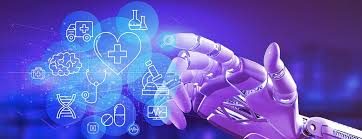Healing with Code: How Artificial Intelligence is Transforming Healthcare:
By [Vansh Dutta] | Wellness & Wisdom Blog | June 2025
In a world where medical miracles often come at the cost of complexity and time, Artificial Intelligence (AI) has stepped in not as a replacement for doctors, but as a powerful ally. Imagine a future where machines help detect cancer earlier, monitor chronic conditions remotely, and even predict health crises before they strike. That future isn’t decades away—it’s already here.
🧠 What Is AI in Healthcare, Really?
Let’s strip away the jargon. AI in healthcare is essentially about teaching machines to "learn" from data—patient histories, medical imaging, lab results, even doctor’s notes—to help improve decision-making. Whether it's a chatbot helping book your appointment or a smart algorithm reading your MRI scan, AI is designed to work with humans, not instead of them.
🔍 Diagnosing with Precision: AI as a Digital Detective:
One of the most powerful uses of AI lies in medical imaging. AI models can now analyze X-rays, MRIs, and CT scans faster and sometimes more accurately than the human eye. For instance:
-
Breast cancer detection using AI can now identify early-stage tumors invisible to even seasoned radiologists.
-
Retinal scans powered by AI are helping catch diabetic eye disease before symptoms appear.
This isn’t science fiction. These tools are already being used in hospitals across the globe.
🏥 Smarter Hospitals, Safer Patients:
Hospitals are chaotic ecosystems, and AI helps bring order. From predicting which patients might need ICU beds, to reducing unnecessary diagnostic tests, AI improves hospital workflow and helps prevent medical errors.
🔑 Real-World Example: During the COVID-19 pandemic, AI helped predict out break hotspots and track patient deterioration in real time, saving both lives and resources.
💬 The Rise of AI Health Assistants:
Ever asked Google if your headache might be a tumor? (We all have.)
Now, AI-powered virtual health assistants can provide symptom triage, medication reminders, and even mental health support—with far more accuracy than a random internet search. They don’t replace doctors, but they do bridge gaps, especially in rural or underserved communities.
❤️ The Human Side of AI:
What makes AI truly powerful isn’t just its algorithms—it’s how it frees up time for human connection.
Doctors often face burnout due to endless paperwork. AI can automate documentation, leaving doctors with more time to actually talk to their patients. In healthcare, that human interaction—the warm reassurance, the listening ear—is irreplaceable.
⚖️ Ethics, Bias, and Trust:
Of course, we must tread carefully. AI is only as good as the data it's trained on. If that data is biased, so is the diagnosis. Transparency, ethical oversight, and human review must always stay in place. As patients, we deserve to know how decisions are made—and why.
🌍 The Road Ahead: A Healthier, Smarter Tomorrow
From wearables tracking heart rhythms to AI predicting pandemics, the future of AI in healthcare is hopeful—and deeply human. The goal isn’t to replace caregivers, but to empower them. To make healthcare not just more efficient, but more equitable, personal, and proactive.
We may be building this future with code, but the heartbeat behind it is very much human.
📌 Keywords:
Artificial Intelligence in Healthcare, AI in Medicine, Smart Hospitals, AI Diagnosis, AI Ethics in Healthcare, Future of Healthcare Technology







Comments
Post a Comment